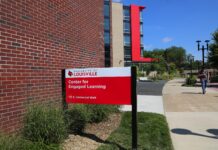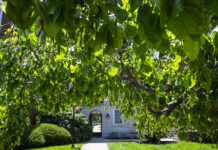
The University of Louisville and partners have been awarded $1 million to launch a new coalition aimed at cementing the region’s role as a leader in next-generation manufacturing through diverse innovation and talent development.
Funding for the effort, dubbed Generate Advanced Manufacturing Excellence for Change (GAME Change), comes via the U.S. National Science Foundation’s inaugural Regional Innovation Engines, or NSF Engines, program. GAME Change received one of just 44 type-1 NSF Engines planning grants, qualifying it to compete for a type-2 award worth up to $160 million — the largest award NSF has ever offered.
“UofL is proud to help lead the GAME Change coalition and work to ensure regional next-manufacturing competitiveness through research, innovation and workforce development,” said Kevin Gardner, UofL’s executive vice president for research and innovation. “Kentucky and this region are ripe with opportunity, and through this work, we can accelerate our strong manufacturing sector’s growth as a national leader.”
The goal, he said, is to secure economic competitiveness throughout the Southeastern Commerce Corridor (SCC) of Kentucky and Tennessee, with a focus on next-generation and advanced manufacturing, supply chain and logistics, more durable and sustainable materials and more. Louisville alone is home to more some 2,400 manufacturing firms in areas ranging from food and beverage to automotive, with a total workforce of more than 82,500.
As part of the coalition, UofL will leverage its manufacturing and technology expertise to provide research support and talent development to industry partners. This includes connection to the UofL-based Kentucky Manufacturing Extension Partnership statewide resource center, along with labs, inlcuding the multi-disciplinary Louisville Automation and Robotics Reseach Institute (LARRI), led by J.B. Speed School of Engineering researcher and GAME Change teammember, Dan Popa.
UofL also will lead the development and launch of a manufacturing-centered venture studio, offering funding, mentoring and training to help new tech-based companies spin up and out. The venture studio will draw on programming and resources offered through UofL New Ventures, part of the Office of Research and Innovation, inclduing innovation training and funding via UofL’s eight-week LaunchIt startup bootcamp and a suite of grants focused on translating research into marketable products.
“UofL already has a long track record of success in getting its research out into the world as new products, businesses, and more with the power to radically improve the way we live and work,” said UofL principal investigator Will Metcalf, an associate vice president for research and innovation who leads UofL New Ventures and the new venture studio. “With GAME Change, we can catalyze that earned expertise to help our regional manufacturing economy thrive.”
In addition to UofL, the GAME Change coalition includes research, education, economic development, industrial and manufacturing leaders of the SCC, spanning the I-65 and I-75 thoroughfares and the promising high-growth centers of Louisville, Lexington, Nashville, Knoxville and Chattanooga that outline an Appalachian region in need of greater connectivity and economic resiliency.
Launched by NSF’s new Directorate for Technology, Innovation and Partnerships and authorized by the “CHIPS and Science Act of 2022,” the NSF Engines program uniquely harnesses the nation’s science and technology research and development enterprise and regional-level resources. NSF Engines aspire to catalyze robust partnerships to positively impact regional economies, accelerate technology development, address societal challenges, advance national competitiveness and create local, high-wage jobs.
“These NSF Engines Development Awards lay the foundation for emerging hubs of innovation and potential future NSF Engines,” said NSF Director Sethuraman Panchanathan. “These awardees are part of the fabric of NSF’s vision to create opportunities everywhere and enable innovation anywhere. They will build robust regional partnerships rooted in scientific and technological innovation in every part of our nation. Through these planning awards, NSF is seeding the future for in-place innovation in communities and to grow their regional economies through research and partnerships. This will unleash ideas, talent, pathways and resources to create vibrant innovation ecosystems all across our nation.”


































